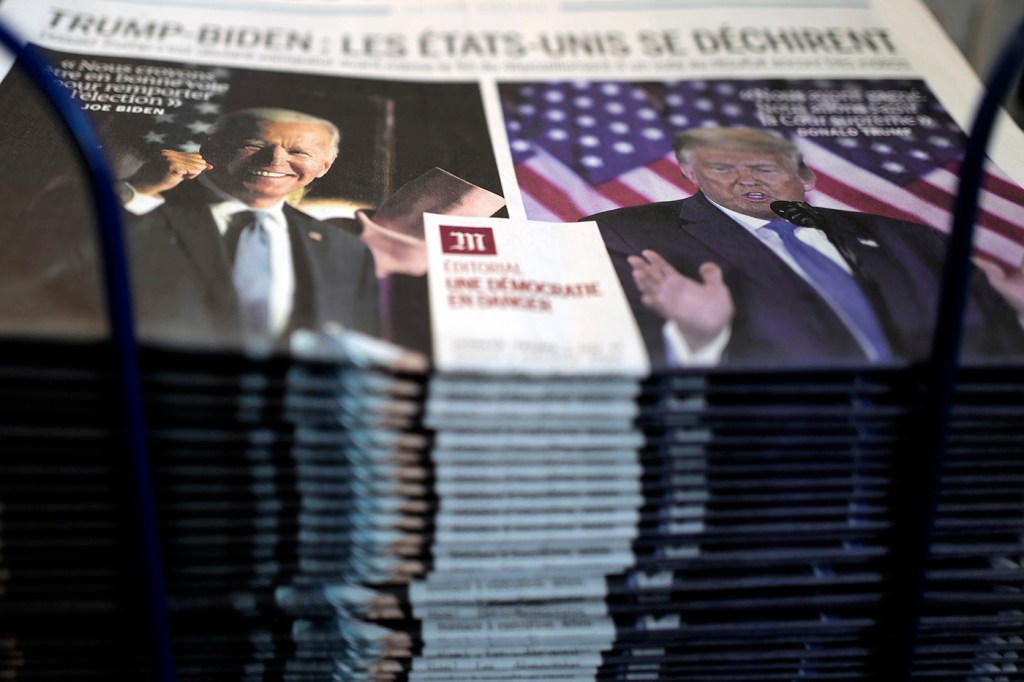What a Biden presidency means for US-EU ties

The presidency of Joe Biden will almost certainly improve transatlantic ties overnight, says Mai’a Cross, the Edward W. Brooke professor of political science and international affairs at Northeastern.
The president-elect is expected to push on repairing severed alliances, says Cross, who studies international cooperation, especially in the areas of European foreign and security policy. In Europe, she says, that could restore the United States’ reputation as a globally oriented superpower that values allies—and condemns authoritarian leaders who seek to undermine international norms.

Mai’a Cross is the Edward W. Brooke professor of political science and international affairs at Northeastern. Photo by Adam Glanzman/Northeastern University
“The European Union will look to rapidly re-build the transatlantic alliance given that this has always been the most important relationship for them,” says Cross.
Biden is expected to restore and repair all of the nation’s memberships in international organizations, Cross says. He has signaled a commitment to immediately rejoin the Paris climate agreement. He could reverse Trump’s decision to withdraw from the World Health Organization.
Cross also anticipates a shift in the country’s response to the coronavirus pandemic, laying the groundwork for a more international effort. Biden plans to announce a 12-person COVID-19 task force and has vowed to hold briefings with government scientists and health experts. His approach might involve coordinating a global response to the pandemic, and encouraging international cooperation in distributing a vaccine.
“We can expect to see the U.S. go from having no role globally in addressing the pandemic to taking on a leadership role,” says Cross.
Biden’s election also has implications for what happens to the North Atlantic Treaty Organization in the future, says Cross. President Donald Trump is said to have spoken privately about withdrawing from the military alliance. Rather than insulting European allies, and seeking to undermine NATO, Cross predicts Biden will likely infuse the alliance with renewed commitment and funding, primarily to deal with Russian aggression.
“The EU will, of course, welcome this, and the more Biden emphasizes the need for Europeans to play a strong role in NATO, the better,” she says. “Biden’s foreign policy will reinvigorate NATO and strengthen the transatlantic security alliance.”
There will be more of an emphasis on trade agreements under a Biden presidency, says Cross, but it’s unclear whether the president-elect will favor progressive trade deals with Europe. That will depend on which version of Biden emerges once he takes office, says Cross. He could govern as a left-center figure akin to Hillary Clinton or President Obama, who supported a neo-liberal free trade approach, or as more of a progressive focused on protecting the environment and workers. The latter would align him more closely with European nations, says Cross.
A Biden presidency will also add a layer of complexity to the U.K.’s post-Brexit future, giving the European Union a boost in its trade negotiations with the United Kingdom, says Cross.
“[Biden’s presidency could] make the U.K. feel a little more isolated from the U.S. and perhaps more willing to give in to what the EU is demanding on its side for the trade deal,” she says. “And I think overall that would actually smooth the process of Brexit, rather than having the U.K. just go off the cliff edge, which currently it’s poised to do.”
As “ecstatic” as European leaders are about the outcome of the election, Cross cautions they may still regard the U.S. as unreliable over the long haul, partly because the election has underscored the vast and growing gap between American liberals and conservatives.
Still, there has been a silver lining for European nations: They’ve been forced to integrate better in the realms of security and defense, with the understanding that they can no longer rely on the U.S.
“Even if things quickly return to what was normal, there is a sense that regardless, they need to be able to stand on their own two feet and to act together as Europeans in order to exert influence on the world stage that favors a liberal democratic order,” Cross says.
For media inquiries, please contact Mike Woeste at m.woeste@northeastern.edu or 617-373-5718.





